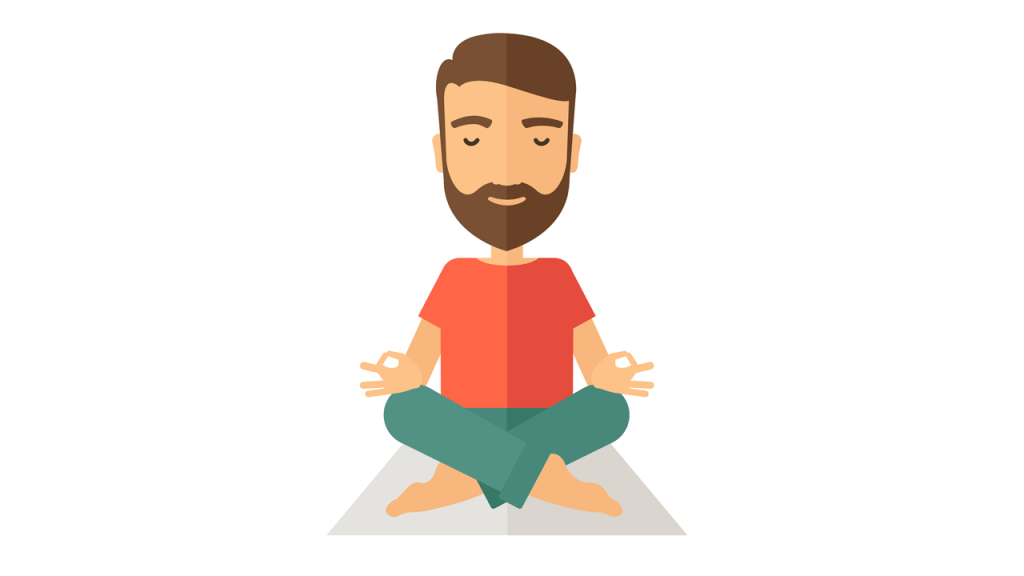When is the Last Time You Stepped Outside Your Comfort Zone?
Newbies to sports betting often have a hard time focusing. They bet on a dozen different sports every day. They try every system they read about. They’ll jump from one thing to the next, never working on any one aspect of betting long enough to become skillful and profitable.
Intermediate or advanced punters on the other hand may find themselves doing the exact opposite. They may bet on only one sport ever, and may use a single system. Every day, they wake up and follow through on the same set of patterns and habits.

You should never be stuck in a habit, but if you are going to get stuck in them, make sure they’re good ones.
These habits produce results (hopefully), and they are comfortable. Both are motivation to continue from one day to the next without any major changes.
But I would urge you to step out of your comfort zone now and again and break your habits. It might seem counter intuitive if you are thinking back to your newbie days when you couldn’t concentrate long enough to develop true expertise. But there may be some unexpected benefits.
To be clear, there are a number of ways you can step beyond your comfort zone, but some of the main ones include:
- Betting on different sports than you usually do.
- Trying out new strategies.
- Testing adjustments to your existing strategies.
- Researching new ideas for betting.
- Opening up to other bettors about your challenges.
Let’s talk about the advantages now.
Growth only takes place outside your comfort zone.

Remember John in “The Boy in the Plastic Bubble”? He had virtually no skills then.
I am certainly not the first person to say that growth is something which happens outside of your comfort zone. I would not begin to hazard a guess who did.
Actually, I think under the right circumstances, a significant amount of growth can take place in one’s bubble of security. While we are feeling safe and stable, we are less stressed. While we are less stressed, we may be more focused and positive. That can lead to improvements in our skills and outlook.
I would perhaps amend this statement to say, “Evolution only takes place outside your comfort zone.” We evolve when we are tested. By tackling challenges, we develop new approaches. We stretch our limbs further, we run faster, we lift harder. We discover we are capable of more than what we previously believed.
Rather than waiting for hardship to strike under circumstances you cannot control, it makes sense to take controlled, regular steps outside your comfort zone to tackle new challenges head-on. That brings me to my next point.
Eventually your habits and patterns will no longer deliver the results you expect. You need to be fluid and adaptable.
The key to generating reliable returns in a market which is dominated by uncertainty is to come up with a systemic approach to planning your bets. To this end, you probably have worked hard (or are working hard) to develop a set of strategies and techniques which you can use every time you place a wager.
Even the world of sports is constantly evolving, however, and that means that if you do not keep up with the changes, your systemic approach will no longer perform. It may happen tomorrow, or it may happen years from now—but one day, it is pretty much a guarantee.
In fact, if you end up making betting a long-term part of your life, you will probably face this sort of challenge again and again. That is one of the reasons why sports betting is such a tough career.
If you never break outside of your comfort zone, two things will happen. The first is that you will not be aware of different possibilities which could help you one day. The second is that you will develop a rigid mindset and approach.
When something is rigid, it can become brittle. Once it becomes brittle, it can snap in half at the first gust of adversity. That could happen to your strategies and to you.
If on the other hand you regularly go out of your way to discover new ideas and try new techniques, you will introduce yourself to more ideas and approaches.
More importantly, you will start to get used to thinking outside the box and being fluid and adaptable.
That means when adversity does strike, you will be more likely to bend than break. You will also more likely succeed in adjusting your system to accommodate the changes. That way it will not break either, and can continue to bring you betting profits.
If you get too grounded in routine, you may become more and more averse to risk.
Rigidity not only results in brittleness, but has another adverse effect on a bettor as well, and that is a higher and higher degree of risk aversion. You get addicted to the perception that you are “safe.” You are not used to confronting uncertainty, and lose confidence in your ability to handle it if you are forced to do so.
As a result, you lose more and more faith in yourself. You also become more and more afraid of taking chances. In any field, that can be dangerous, but for a bettor in particular, it can present some pretty serious problems.
Risk is simply part of betting, and there is no way to get around that. The punter who can no longer handle risk will eventually take fewer bets (likely because something has gone wrong—but not necessarily). Eventually, he or she may feel too nervous to bet at all.
The key to avoiding this kind of predicament is to continuously expose yourself to the unknown. When you choose to move outside your comfort zone, you have the opportunity to take steps before you do to mitigate risk. In doing so, you discover that you can handle uncertainty, and that risk is not entirely a negative.
After all, it is through exploring the unknown that we have a chance to discover new skills and knowledge which can help us become more profitable bettors. If we want to keep learning, we have to be willing to take at least some risks.
Betting on different sports might help you see the sports you wager on now in a new light.

Arguments can be made on both sides – Are MMA and Boxing vastly different or remarkably similar?
How many different sports do you typically bet on? If you have your nose to the grindstone and you are working hard toward becoming a sharp, that answer is probably no more than several. It may even just be one.
That is something I commend overall. Betting on numerous different sports just is not an efficient approach to developing focused expertise in any of them. Wagering on just one or two or three ensures that you are dedicating the time and concentration you need to make real strides forward.
But once in a while, breaking outside this comfort zone is not a bad idea, especially if you bet on a sport which is in the same general “area” as the one you are wagering on now.
Say for instance that you usually bet on boxing. You are pretty good at what you do, but you have a hard time thinking outside the box about ways in which you could improve.
So you decide to place some wagers on MMA — something you have not tried before. In some respects, MMA and boxing are similar. Both involve betting on fighters who are facing off in one-on-one matches. Both entail considering factors like style, conditioning, and psychological aspects when you plan your bets.
But in other respects, they are obviously quite divergent. The techniques and rules are different, and the mindsets of the fighters may be as well. Athletes are drawn to their individual sports for individual reasons. There is a lot more freedom and flexibility in MMA, and a great deal more variation in the approaches that fighters take.
So when you bet on MMA, you will find yourself in a situation which is at once familiar and unfamiliar. You should find that at least some of what you have learned betting on boxing is applicable, but that in other respects, you need to analyze the sport differently.
In doing so, you will have to stretch yourself. You will need to look at the match from a new angle. You may discover insights which actually apply to boxing and not just MMA, but which you never would have thought of if you were just sticking with your usual patterns of thinking. Then you can look at boxing with fresh eyes in the future.
I do recommend that you reduce your stake size or even bet on paper if you are wagering on a sport you are not well-versed in. You likely do not have an edge, and if you win, luck will be playing a big role in that.
So you should not risk your money unnecessarily. If you do put down a stake, do it to motivate yourself to take the exercise seriously.
Testing a new system may give you ideas for improving your current strategies.
Even if your system is working out, you can always use more of an edge. Plus, as mentioned previously, eventually a day is going to roll around when your system stops working as well as it does now, and you will need that added edge.
Instead of waiting for that day, why not try testing out a new system now? Yes, it involves some research and hard work, and yes, it may be uncomfortable. But it can pay off in big ways.
Many of the strategies you try probably will not be a fit for you; that is just the way these things tend to go. By now, though, you have some understanding of what you find intuitive, so you probably will be better at selecting techniques to try than you were when you were a newbie.
Whether the techniques you test are similar to what you are using now or differ vastly, this is yet another way to stretch your brain. Once again, you may glean insights which you can bring back to enhance your regular techniques.
Once again, do not use your typical full stake sizes when doing an exercise like this. Either test the strategies on paper, or use a significantly reduced stake size.
You never know what you might discover you excel at.
Let’s return to the example on boxing and MMA. Maybe you will only ever end up betting on MMA once or twice, or perhaps you might return to it sporadically. But there is another possibility, which is that you may find MMA intuitive. You might even discover you like it more than boxing.
If that is the case, you may actually decide to bet on MMA on a regular basis going forward or you might eventually end up switching from boxing to MMA altogether. If you had not pushed beyond your comfort zone, you never would have discovered that it suited you.
The same goes for betting systems. A technique which you try on a whim might actually be a great fit for your betting style and personality. You could find that it makes a great permanent addition to your betting toolbox. It might even be a game-changer.
Moving beyond your comfort zone can help you in ways you might not imagine.

Don’t fall too deep into despair. The problems and issues can be fixed.
I was having a hard time with my betting at one point a number of years back. Initially, I did what I usually did, which was struggle to try and figure out what was going wrong on my own. Weeks went by with no solution in sight.
Somehow, I hit a point of greater despair than usual, so this time I ended up doing something different. I got online and posted about my difficulty on a betting forum.
What ensued was initially very uncomfortable. My failures were put under a microscope in public. I was thankful that people were taking an interest in my situation, but I also felt very exposed. I could no longer deceive myself that things were not as bad as they really were.
For the first few days, the conversation didn’t lead anywhere productive, but I told myself to hang in there and keep replying. It was not easy.
Eventually, a stranger sent me a PM, and gave me some really helpful advice. It was enough to get me out of my rut and back to making some progress. That was enough to stop me from giving up for another few months (as I would have done before).
But the real value didn’t unfold until later. We kept in contact, and got to know each other better over time, to the point where he eventually felt comfortable sharing his own system with me.
That system ended up being a revolution for me, and I ended up with a new friend as well. So those were two big bonuses which I never could have predicted, all because I was willing to make myself uncomfortable for a few days in public.
Conclusion: Routines Are Valuable, But So Is Breaking Them
If you want to be a successful punter, routines are not just important, they are crucial. You cannot hope to maintain an edge without them. They are the solid vessel on which you sail the treacherous seas of risk.
But now and again, you need to at least dip a foot in those uncertain waters, breaking with routine and comfort. Doing so will keep you flexible, help you develop the psychological adaptations you need to keep confronting risk, and prepare you in advance for the challenges ahead.
Leaving your comfort zone may also reward you with tools, techniques, and connections you would never otherwise have found. Any one of these could just be the long-awaited breakthrough you need.
For More Articles About Why Your Strategy May or May Not Be Working, Take a Look at…


